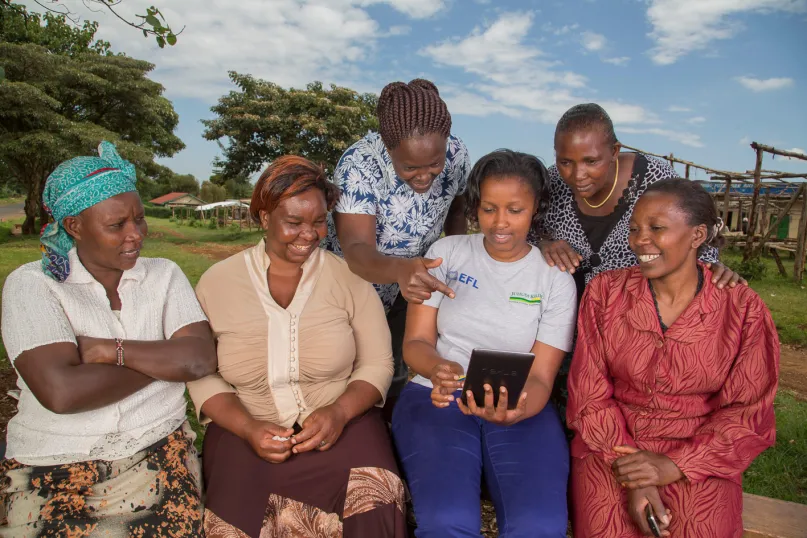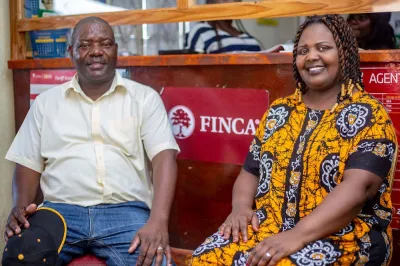From Outcomes to Impact

At Juhudi Kilimo, a Kenyan MFI that serves rural smallholder farmers and microentrepreneurs, the board and senior management have come to appreciate the importance of collecting reliable data on customer outcomes. This data helps them understand how well their financial services are working for their customers and how they may need to be adapted.
For example, outcomes data helped the organization identify repayment constraints and declining living standards for young people, women and new customers and to justify increased support for these segments. The data also prompted them to implement customized communication on the value of savings to help clients become more resilient.
To get this data, Juhudi Kilimo conducts regular customer surveys which aim to understand customers’ needs and perceptions of changes in their lives. David Njiru of the organization’s Social and Environmental Performance Management Committee described their approach, saying:
“We seek to understand the type of change that takes place through our interaction with customers and to have a positive impact in line with our mission. We monitor who we are reaching, the level of satisfaction, and both positive and negative outcomes. We then use this information to adapt our approach and ensure we improve the livelihood of the smallholder farmers and micro-entrepreneurs we serve.”
What are outcomes vs impact?
When we talk about “outcomes,” we are referring to noticeable changes, positive or negative, at the customer level from a mid-term perspective (a few months). They are measured through direct client surveys to understand how these outcomes occur and if they can be plausibly associated with the services provided by the organization.
“Impact,” on the other hand, may be defined as long-lasting changes at the customer level that can be directly attributed to the services provided by the organization from a long-term perspective (several years).
Understanding outcomes helps strengthen impact strategies.
In line with the recommendations in our updated Universal Standards for Social and Environmental Performance Management, Cerise+SPTF promotes strong outcomes management by financial inclusion stakeholders, especially among financial service providers (FSPs) and social investors.
Using the Sustainable Development Goals as a framework for outcomes measurement
As the Sustainable Development Goals (SDGs) have become more accepted by the international development community, they can help us to focus our efforts on impact and outcomes. However, the SDGs are also very ambitious and can seem overwhelming to address, so we selected targets from six which are most relevant to the work of financial inclusion:
- Targeting vulnerable populations (SDG 1: No poverty).
- Improving living conditions (SDG 2: Zero hunger through food security and sustainable agriculture & SDG 8: Inclusive economic growth and decent work).
- Gender equality (SDG 5).
- Environmental protection (SDG 13, SDG 15).
We then started out on the complex but necessary task of measuring client outcomes against these SDGs, mobilizing our community to work together to build actionable tools and guidance for collecting and analyzing client data. Here’s what we’ve done so far:
- First, we worked with FSPs and social investors to identify and test the most relevant SDG targets and indicators, producing a paper which provides a framework of actionable indicators based on a selection of SDG targets.
- We then collaborated with multiple social investors, development financial institutions (DFIs), data service providers and over 20 FSPs in 10 countries in Africa, Asia, Eastern Europe to provide guidance on social strategy, data collection and analysis for integrating customer voices into decision-making.
- Based on that experience, we worked with our community to develop a method and common set of outcome indicators, from which we developed a core outcome questionnaire in English, French and Spanish and a list of potential standard outcome indicators. This selection does not imply exclusive use of these indicators; FSPs can choose to add other indicators or collect different ones, since data collection must be driven, above all, by data that can inform business decisions.
By the end of 2024, we aim to present a core set of standard indicators that can apply to most FSPs and facilitate benchmarking with similarly purpose-driven institutions. These proposed standard indicators will be included in the SPI Online assessment tools as part of a new Outcomes/Sustainability dashboard.
Challenges in collecting and using outcomes data
During this process, we have learned from FSPs and social investors about three key aspects which have proved challenging:
Data quality: Data collected by FSPs is sometimes incomplete or biased. For example, customers tend to “inflate” revenues to increase their chances of loan approval, leading to overestimated income data. To help address this issue, Juhudi Kilimo has trained its staff to understand the value of high-quality data and that the Business Development Officers, with their direct relationships with the clients, are the pillars of good outcomes management.
Data collection: The customer outcomes data needed by FSPs is often not found in the management information system (MIS), but is instead stored in different places in different formats, making it hard to manage. Digital tools and integrated platforms can help capture metrics more efficiently, increase data accuracy and triangulate information from different sources (e.g. complaints mechanisms, loan application, clients surveys). Some FSPs use simple online tools such as KoboToolbox or ODK to collect customer data online and link them directly to the MIS to analyze results by customer type, thus building a robust risk management system and reducing the cost of data collection.
Data analysis and use: FSPs often lack the capacity and data visualization tools needed to conduct reliable data analysis and make results-based decisions efficiently. To manage this challenge, the Georgian MFI, Crystal, uses local research companies to help them with the segmentation and in-depth analysis of external client surveys. Juhudi Kilimo shares the data they collect via customized automated dashboards divided by key customer segments (rural/urban, gender, income level) to help determine what kind of product adjustments or client support is needed at the branch level.
Keeping the momentum and addressing challenges
Because of their robust outcomes management system, Juhudi Kilimo has attracted new funders, both locally and internationally, and has grown its business. As David Njiru told us, “Outcomes measurement has kept us aligned with our mission, ensuring that products remain relevant and focused on client needs. It has also helped in reporting to the shareholders and funders by demonstrating the impact of our loans and non-financial services at the customer level.”
We are seeing strong momentum in outcomes management in the financial inclusion sector, but challenges still remain for implementing a simple, concrete approach embedded in the daily operations of the FSPs.
Cerise+SPTF has gathered a global community of practitioners committed to strengthening client protection and building comprehensive customer data-driven strategies and operations. Together, we can work to address the remaining challenges and continue our work with social investors and responsible FSPs to harmonize outcomes management frameworks and practices. We hope you’ll join us!
All resources and joint publications on this topic: Collection of Resources for Outcomes Data Management in relation to the SDGs
Community of Partners:
|


